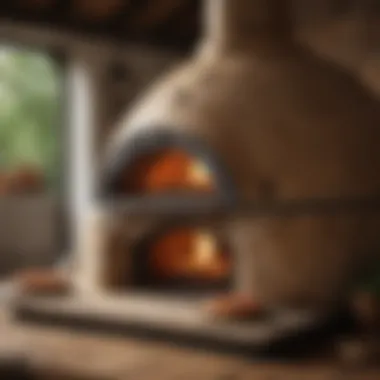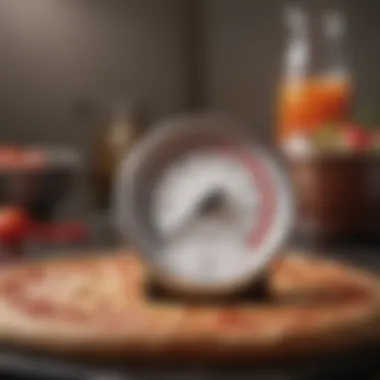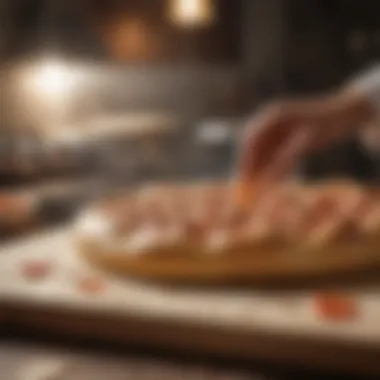Unlocking the Perfect Ooni Pizza Temperature: A Complete Guide


Pizza Recipe Introduction
This comprehensive guide aims to uncover the crucial elements that determine the ideal Ooni temperature for crafting exquisite pizzas. Through an exploration of the intricate relationship between temperature and pizza quality, readers will gain valuable insights into how to achieve culinary perfection when using an Ooni pizza oven.
Ingredients and Preparation
To embark on this culinary journey, it is essential to have the following key ingredients at hand: high-quality flour, yeast, water, salt, and a selection of fresh toppings. Detailed step-by-step instructions will guide you through the process of preparing the perfect pizza dough and sauce. Additionally, valuable tips on handling and preparing the ingredients will ensure a seamless cooking experience.
Assembly and Baking
As you assemble your pizza with a harmonious combination of toppings, it is vital to pay close attention to oven temperature and baking time. Achieving the perfect bake requires meticulous precision in setting the Ooni temperature and monitoring the pizza throughout the baking process. This section will also explore various customization options and variations to suit your personal taste preferences.
Serving Suggestions and Pairings
For a truly memorable dining experience, consider enhancing your pizza with a range of garnishes, additional toppings, and delectable sauces. Moreover, expertly curated pairing suggestions will elevate your meal, offering a delightful array of beverages and side dishes to complement the flavors of your pizza.
Cook's Notes and Tips
In this section, you will discover a wealth of additional tips and tricks for enhancing the flavor and texture of your pizza. From ingenious flavor combinations to troubleshooting common issues that may arise during preparation and baking, these insights are designed to empower you in your culinary endeavors.
Introduction
Understanding the Significance of Ooni Temperature
Key Elements of Pizza-Making Process
In the realm of pizza creation, the Key Elements of Pizza-Making Process play a pivotal role in shaping the final product. From selecting the finest ingredients to honing the techniques for dough preparation and topping arrangements, each step contributes to the overall culinary experience. This section highlights the fundamental components essential for achieving pizza perfection, underscoring the essence of precision and expertise required in crafting delectable pies.
Impact of Temperature on Dough and Toppings
The Impact of Temperature on Dough and Toppings is a critical aspect that can make or break the quality of the pizza. The delicate balance between heat levels and the characteristics of the dough directly influences its texture, rise, and flavor. Moreover, the temperature also affects the behavior of toppings during the cooking process, ensuring they are cooked to perfection without losing their essence. Understanding this interplay is key to producing pizzas that are consistent in quality and delight the palate of discerning connoisseurs.
Essential Equipment: Ooni Pizza Oven


Benefits of Using Ooni Oven
The Ooni Pizza Oven stands out as a game-changer in the realm of pizza-making due to its innovative design and unparalleled performance. Its ability to reach high temperatures rapidly and maintain consistent heat levels throughout the cooking process ensures that pizzas are baked to perfection, with a delightful char and crispness. This section delves into the unique advantages that the Ooni Oven brings to the table, elevating the pizza-making experience to new heights of excellence.
Factors Influencing Temperature Control
Efficient temperature control is of utmost importance when using the Ooni Pizza Oven to create culinary masterpieces. Factors such as the type of fuel source utilized and the design of ventilation systems play a crucial role in determining the stability and distribution of heat within the oven. Understanding these influencing factors is essential for aspiring pizza maestros seeking to harness the full potential of their Ooni Oven and unlock the perfect temperature settings for unparalleled gastronomic delights.
Factors Influencing Ooni Temperature
To unravel the mysteries behind achieving the ideal Ooni temperature for crafting exceptional pizzas, one must delve into the factors that influence this crucial element. Understanding these intricate variables is paramount in mastering the art of pizza-making excellence. By exploring the type of fuel source, ventilation and airflow dynamics, as well as insulation and heat retention properties, enthusiasts can fine-tune their Ooni oven to create culinary masterpieces.
Type of Fuel Source
When it comes to Ooni ovens, the choice between wood and gas as fuel sources plays a pivotal role in determining the heat distribution within the oven. Each fuel type brings its distinctive characteristics to the table, impacting the overall cooking process. Exploring the unique traits of wood and gas fuels in the context of heat distribution sheds light on their suitability for different pizza styles and preferences.
Wood vs. Gas: Impact on Heat Distribution
The debate between wood and gas as fuel sources revolves around their specific impact on how heat is distributed within the Ooni oven. Wood-fired ovens traditionally provide a more authentic cooking experience, infusing pizzas with a distinct smoky flavor that is unparalleled. On the other hand, gas-fueled ovens offer convenience and consistency in heat output, allowing for more precise temperature control during the cooking process. Considering the heat distribution characteristics of both fuel sources is crucial in optimizing the Ooni temperature for diverse culinary outcomes.
Ventilation and Airflow
Optimizing airflow within the Ooni oven is a critical factor in ensuring consistent heat circulation, contributing to the overall equilibrium of temperature during the pizza-making process. Understanding how ventilation systems interact with airflow dynamics enhances the capacity to maintain a stable cooking environment, resulting in perfectly cooked pizzas every time.
Optimizing Airflow for Consistent Heat
The efficiency of airflow optimization lies in its ability to facilitate a consistent heat environment within the Ooni oven. By strategically managing ventilation systems to regulate the flow of air, pizza enthusiasts can achieve uniform heat distribution, minimizing temperature differentials that may affect the cooking outcome. Mastering the art of optimizing airflow is indispensable for elevating the Ooni temperature control experience to new heights of precision and perfection.
Insulation and Heat Retention
Materials that support temperature stability are indispensable in preserving the heat generated within the Ooni oven, thereby enabling a steady and reliable cooking environment. Exploring the insulative properties of various materials provides insights into how heat retention can be maximized to enhance the efficiency and effectiveness of the oven.
Materials that Support Temperature Stability
The selection of materials that support temperature stability directly impacts the retention of heat within the Ooni oven. Investing in high-quality insulation materials offers enhanced thermal efficiency, reducing heat loss and ensuring consistent temperature levels throughout the cooking process. Understanding the advantages and disadvantages of different insulation options empowers pizza enthusiasts to make informed decisions in optimizing the Ooni temperature for superior culinary outcomes.


Setting the Perfect Ooni Temperature
Setting the perfect Ooni temperature is a crucial aspect of achieving exceptional pizza quality. The right temperature influences the texture of the crust, the balance between crispy and chewy elements, and the overall flavor profile of the pizza. It is at the core of the pizza-making process, directly impacting the final product's quality. Therefore, mastering the art of setting the perfect Ooni temperature is essential for any pizza enthusiast seeking culinary excellence.
Preheating Techniques
Recommended Preheating Time
When it comes to preheating the Ooni oven, the recommended preheating time plays a pivotal role in ensuring an optimal cooking environment. This specific aspect determines how well the oven reaches the desired temperature before introducing the pizza for baking. The recommended preheating time is a popular choice among skilled chefs as it guarantees consistent results and minimizes the risk of undercooked or overcooked pizzas. Its unique feature lies in its ability to create a stable heat foundation, ensuring even cooking throughout the baking process. While there are variations in preheating times based on recipes and pizza styles, adhering to the recommended preheating time is a safe bet for achieving perfect pizzas consistently.
Strategies for Even Heat Distribution
Achieving even heat distribution within the Ooni oven is essential for uniform and thorough cooking of the pizza. Strategies for even heat distribution focus on optimizing airflow and strategically placing the pizza within the oven to avoid hot spots. This critical aspect ensures that each part of the pizza cooks at the same rate, preventing unevenly cooked sections. The key characteristic of these strategies is their ability to enhance the overall cooking experience by yielding pizzas with a consistent texture and flavor profile. While the process may require some experimentation and adjustment based on individual ovens, mastering these strategies can significantly elevate the quality of your pizzas.
Optimal Temperature Ranges
Finding the Sweet Spot for Your Pizza Style
Determining the optimal temperature range for your pizza style is fundamental in achieving the desired outcomes. Finding the sweet spot involves identifying the precise temperature at which your specific pizza style cooks to perfection. This aspect is beneficial as it allows you to showcase the unique qualities of your pizza, whether it's a Neapolitan-style or a Chicago deep-dish. The unique feature of finding the sweet spot lies in the ability to enhance the crust's texture, flavor, and color according to your preferences. Understanding this aspect helps in tailored pizza-making, ensuring that each pie aligns with your culinary vision for a truly exceptional dining experience.
Monitoring and Adjusting Temperature
In the intricate art of perfecting pizza-making, monitoring and adjusting temperature play a pivotal role in ensuring culinary success. This article elucidates the criticality of monitoring and adjusting temperature for Ooni ovens, shedding light on the nuanced elements that contribute to the ultimate pizza experience. By delving into the specifics of temperature regulation, pizza enthusiasts can refine their skills and elevate their gastronomic ventures.
Use of Thermometers
Types of Thermometers for Ooni Ovens
Delving into the realm of thermometers for Ooni ovens unveils a realm of indispensable tools for precise temperature control. The specific focus on types of thermometers underscores the significance of accuracy in temperature readings. Highlighting key characteristics like digital displays, probes, and heat resistance, these thermometers offer a blend of functionality and reliability essential for pizza perfection.
Best Practices for Accurate Readings
Within the domain of temperature monitoring, best practices for accurate readings serve as guiding principles for culinary excellence. Emphasizing the importance of calibration, probe placement, and regular maintenance, these practices ensure consistent and reliable temperature assessments. By adhering to these best practices, aspiring pizza maestros can wield temperature data with precision, paving the path to delectable creations.
Quick Fixes for Temperature Fluctuations


Addressing temperature fluctuations is a conundrum that every pizza aficionado must navigate to achieve culinary nirvana. This section unveils actionable insights into troubleshooting common issues that lead to temperature variability. By exploring key characteristics such as identifying heat leaks, adjusting ventilation, and optimizing fuel sources, readers can quickly rectify temperature fluctuations and maintain ideal cooking conditions.
Troubleshooting Common Issues
Navigating through the labyrinth of temperature inconsistencies demands adept troubleshooting skills. Highlighting the importance of rapid solutions, this subsection delves into common issues like uneven heat distribution, incorrect fuel placement, and clogged ventilation. By elucidating unique features such as heat deflection shields and airflow adjustments, this guide equips readers with strategies to overcome challenges and uphold temperature stability.
Optimizing Pizza Quality with Proper Temperature
In this insightful section, we delve into the crucial topic of optimizing pizza quality through precise temperature control. The impact of temperature on the final taste and texture of the pizza is profound, making it a pivotal element in the pizza-making process. By understanding how temperature influences different aspects of pizza preparation, enthusiasts can elevate their culinary creations to a whole new level.
Texture and Flavor Enhancements
Exploring the effects of temperature on both the crust and toppings is essential in achieving the desired quality of a pizza. The way heat interacts with the dough during cooking significantly affects the texture and flavor profile. Proper temperature regulation can result in a crispy yet airy crust, adding to the overall sensory experience of the pizza.
Effects of Temperature on Crust and Toppings
The temperature plays a critical role in determining the texture and taste of the crust and toppings. The heat from the oven directly impacts the Maillard reaction, which is responsible for creating the desirable browned crust on the pizza. Moreover, the temperature affects the melting point of cheese, ensuring a gooey and decadent topping. Understanding these correlations allows pizza makers to achieve the perfect balance between a crisp exterior and a soft interior.
Achieving Desired Crust Characteristics
Fine-tuning the balance between a crispy and chewy crust is a hallmark of exceptional pizza craftsmanship. The interplay of temperature with dough ingredients and baking time is key to achieving the desired crust characteristics.
Balancing Crispy and Chewy Elements
Balancing the crispy and chewy elements of a pizza crust requires meticulous attention to detail. The temperature controls the rate of starch gelatinization in the dough, affecting the final texture. Achieving the ideal balance ensures a crust that is crispy on the outside while retaining a satisfying chewiness on the inside. This careful calibration of temperature parameters guarantees an exceptional pizza that delights the senses.
Experimenting with Temperature Variations
In the realm of perfecting Ooni temperature for pizzas, an integral aspect deserving substantial attention is experimenting with temperature variations. This section delves into the nuances of adjusting heat levels to achieve desired culinary outcomes. By exploring different heat levels, pizza enthusiasts can unlock a myriad of possibilities in flavor, texture, and cooking efficiency. The ability to manipulate temperature variables empowers cooks to customize their pizza-making process according to specific preferences, elevating the overall culinary experience. Experimenting with temperature variations not only fosters creativity but also hones one's skills in mastering the art of pizza making.
Exploring Different Heat Levels
The exploration of different heat levels holds significant importance when fine-tuning Ooni temperature for pizzas. This aspect focuses on understanding how varying heat intensities impact cooking time and texture. By delving into the effects on cooking time and texture, chefs can gain insights into the intricacies of heat management and its direct influence on the quality of the final product. The consistent interaction between heat levels and food consistency is a vital consideration in achieving culinary precision. This detailed examination provides a foundation for optimizing recipes and techniques, leading to superior gastronomic outcomes.
Customizing Heat Profiles for Unique Pizzas
Adapting heat profiles to suit the requirements of distinctive pizzas is a pivotal aspect in the pursuit of pizza perfection. This section emphasizes the importance of tailoring temperature settings to match the characteristics of specific pizza styles, ingredients, and cooking methods. By innovating approaches to temperature control, chefs can introduce creative solutions to enhance the authenticity and uniqueness of their pizzas. Customizing heat profiles allows for precise temperature modulation, ensuring that each pizza variant receives the ideal heat treatment for optimal results. This meticulous customization not only enhances the culinary prowess of the chef but also elevates the sensory experience of those indulging in the divine flavors of expertly crafted pizzas.
Innovative Approaches to Temperature Control
The implementation of innovative approaches to temperature control revolutionizes the traditional methods of pizza preparation. This facet highlights groundbreaking techniques that enable chefs to wield greater influence over the thermal dynamics during baking processes. By harnessing unique features of temperature control methods, such as advanced heat distribution mechanisms or cutting-edge heating technologies, chefs can streamline their cooking workflow and elevate the quality of their pizzas. While these innovative approaches offer unparalleled advantages in precision and efficiency, they also introduce chefs to new challenges and considerations, prompting continuous improvement in the pursuit of culinary excellence.







